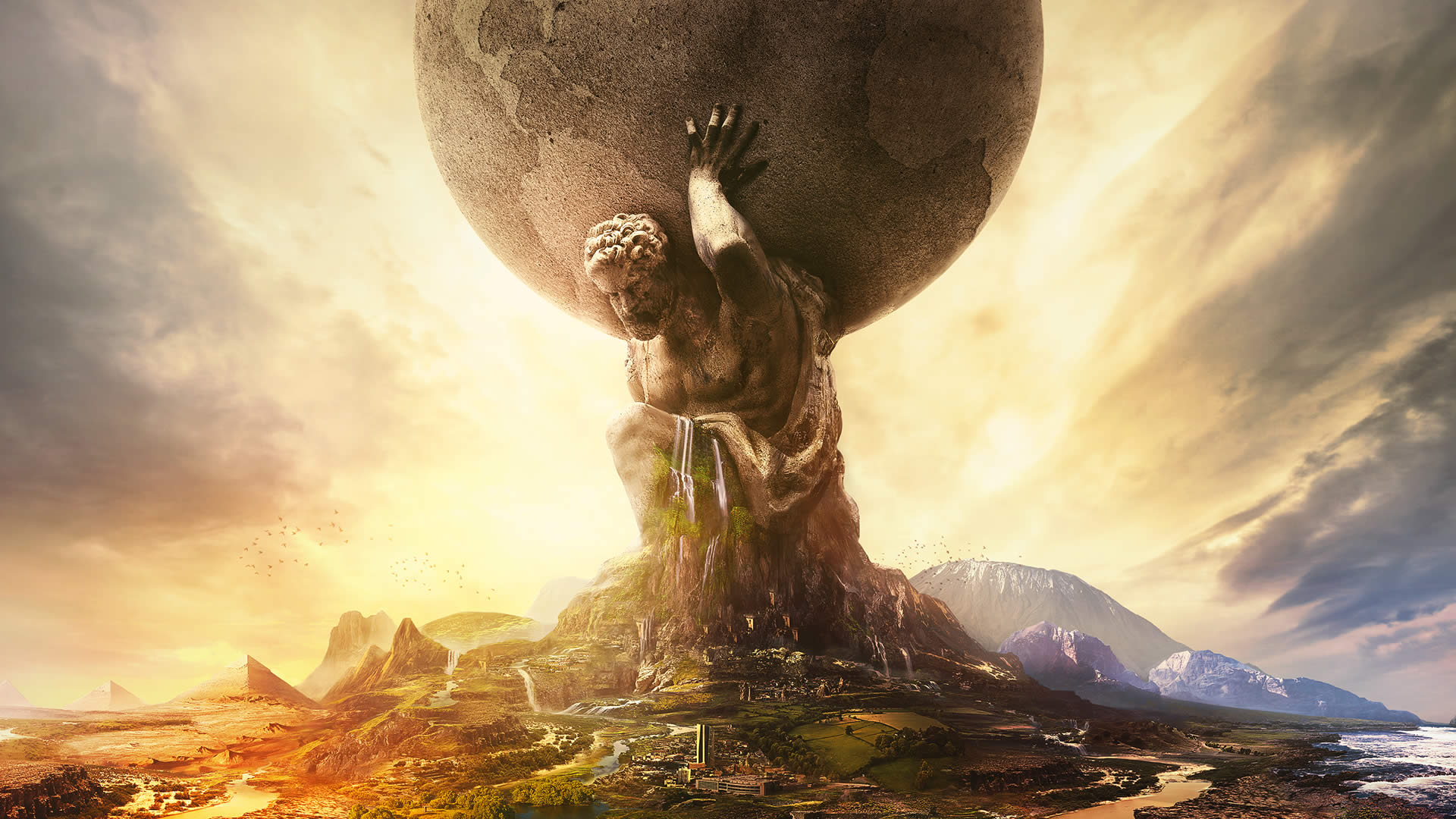I need to share something with you, something I’ve been thinking about for a long time. It’s about a game many of us love, Sid Meier’s Civilization VI. We boot it up, choose a leader, and get lost for hours, maybe even days, in the quest to build an empire that stands the test of time. It feels like fun, like a wonderful escape. But I’m convinced it’s so much more than that. I truly believe that hidden beneath its beautiful map and charming leaders is one of the most powerful tools for learning about real-world strategy.
This isn’t going to be another guide about which Pantheon to pick or how to chop-out a Wonder faster. This is about looking under the hood. I want to walk you through the core mechanics of this game and share how I’ve seen them mirror the tough decisions and complex strategies that shape our actual world—from a CEO in a boardroom to a leader on the world stage. If you’ve ever had that “aha!” moment mid-game where a complex choice suddenly clicked, you know what I’m talking about. Let’s explore that feeling together and uncover the brilliant, practical lessons Civ 6 is waiting to teach us.
How Civ 6 Drills Opportunity Cost into You
If there’s one lesson the game hammers home from the very first turn, it’s this: you can’t have it all. This is the heart of economics, the principle of scarcity. In Civ 6, your most precious resource isn’t gold or faith; it’s the raw Production your cities generate each turn. And every single thing you decide to build with that Production comes with an invisible price tag called “opportunity cost.” That’s a fancy term for everything you could have done but didn’t.
Let’s make this real. Imagine you’re playing as Egypt. Your capital, Thebes, is bringing in 20 Production a turn. You look at your build options:
- You could build a Builder (50 Production): This takes 3 turns. The Builder can improve your tiles, bringing in more food or resources. It’s a direct, immediate investment in your economy.
- You could train a Heavy Chariot (65 Production): This takes a little over 3 turns. This unit is an early-game powerhouse, perfect for clearing out barbarians or putting pressure on a neighbor. It’s an investment in security and power projection.
- You could start the Pyramids (220 Production): This is a huge commitment—11 turns where that city is doing nothing else. You’re not building your economy or your military. It’s a massive gamble. If you pull it off, you get an extra Builder and all your Builders get an extra charge, a phenomenal long-term economic boost.
When you choose the Heavy Chariot, the cost isn’t just 65 Production. The real cost is the three turns you didn’t spend building a Builder and improving your lands. You sacrificed immediate economic growth for immediate security. If you go for the Pyramids, the opportunity cost is immense. If a rival attacks you on turn 7 of the build, you’ll feel the true weight of that decision. You sacrificed your defense for a magnificent dream, and now you might lose everything.
What this feels like in the real world: This is the constant battle every organization and even every person faces. When a startup pours all its cash into developing the “perfect” product, it’s giving up the chance to spend that money on marketing or sales. That’s a huge opportunity cost. When we decide to go back to school for a Master’s degree, we’re not just paying tuition; we’re giving up two years of salary and work experience. Civ 6 doesn’t just tell you about these trade-offs; it makes you live them. It forces you to get good at weighing not just the pros of your choice, but the very real cons of the paths you abandon.
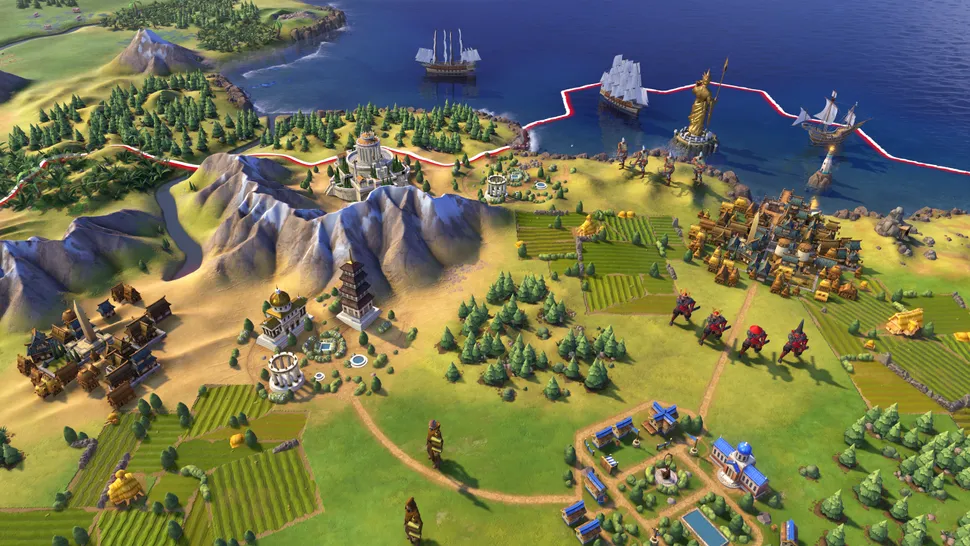
A Crash Course in Geopolitics
Before you even get to make a choice, the game makes one for you: it drops you somewhere on the map. I’m convinced this is one of the most brilliant parts of the game, because it teaches you the fundamental rule of geopolitics: geography is destiny. Where you start can completely shape the story of your civilization.
Think about the different starting positions you’ve had:
- The Coastal Start: You see that ocean and you immediately start thinking about Harbors, the Mausoleum at Halicarnassus, and building a massive navy. Your path seems set towards trade and naval power, just like historic powers like Great Britain or Venice. But you’ve also got a wide-open flank, vulnerable to attack from the sea.
- The Mountain Fortress: You spawn in a valley surrounded by mountains. You’re incredibly safe from invasion. Those mountains are screaming for you to build a Campus or a Holy Site next to them for massive adjacency bonuses. Your game is probably going to be about playing “tall”—having a few, highly developed cities—and focusing on a Science or Religion victory. But you’re also boxed in, with few places to expand. You’re playing like Switzerland.
- The Open Plains: You’re surrounded by flat, fertile land with deer, wheat, and cattle everywhere. You can see the potential for a sprawling empire with dozens of cities. But there’s a flip side: you have zero natural defenses. You are a target from day one, and you know you’ll need to invest heavily in a standing army just to survive. You’re experiencing the historic challenge of nations like Poland.
The game mechanics really drive this home. I love how a narrow, one-tile pass between a mountain and the coast becomes this incredibly important strategic choke point. If you can fortify that one tile, you can hold off an army ten times your size. That’s the Battle of Thermopylae in digital form! Rivers aren’t just for looks; they provide housing and later become trade superhighways if you place your Commercial Hubs correctly.
What this feels like in the real world: Civ 6 trains you to look at your own “map” before you start planning. If you’re launching a business, what does your market landscape look like? Is it a “coastal” market with lots of connections but also lots of competitors, or did you find a defensible “mountain” niche no one else is serving? You learn that a great strategy isn’t something you can copy and paste; it has to be a direct answer to the environment you find yourself in.
Making Smart Bets on the Tech Tree
The Tech Tree is one of my favorite parts of Civ 6. It’s this beautiful, branching road map of human discovery. But it’s not just a ladder you climb one rung at a time. It’s a strategic puzzle that constantly asks you a tough question: do you want to be good at everything, or great at one thing?
I see this as two main approaches:
- The Balanced Scientist: You spread your research around, picking up key technologies from different branches. You get your writing, then your archery, then your masonry. You’re never the most advanced, but you’re never totally vulnerable. You’re resilient. You can handle whatever the game throws at you. The downside? You’ll rarely get those game-changing technologies first.
- The “Beeline” Specialist: This is where you pick a critical late-game tech and pour all your science into a mad dash to get there. Maybe you’re rushing for Industrialization to unlock factories, or for Flight to build the first airplanes. It’s a thrilling, high-stakes gamble. If you get there first, your advantage is enormous. But I’ve seen it go wrong so many times. While I was busy researching Chemistry, my neighbor, who was way behind in science, had built up a massive army of Knights and Crossbowmen—units I had completely neglected—and just rolled over me.
And you can’t talk about the tech tree without talking about Eureka moments. I love this mechanic. Killing a unit with a Slinger gives you a 40% boost towards Archery. Building three mines boosts the tech for Apprenticeship. It’s the game telling you that real innovation doesn’t happen in a sterile lab; it’s sparked by doing things in the real world.
What this feels like in the real world: This is the innovator’s dilemma in playable form. Does a country try to have a broad, stable industrial economy, or does it bet the farm on becoming the world leader in something specific, like green energy or quantum computing? For a business, do you offer a whole suite of products, or do you go all-in on one killer app? The Eureka system is a fantastic reminder that progress comes from the cycle of theory and practice. You have an idea, you test it in the world, and that test gives you the insight for your next big idea.
Diplomacy and Game Theory
Let’s be honest, diplomacy in older strategy games was often pretty basic. In Civ 6, it feels like a real chess match of psychology, reputation, and justification. I’ve found it to be an incredible teacher of game theory.
Every single interaction matters. Another civ offers you 1 gold per turn for your extra copy of truffles. It’s a small deal, but accepting it builds a tiny bit of goodwill that could lead to a valuable alliance later. Declining it might make them wary of you. These are the little moves that set up the big ones.
But the absolute genius of the system is how it handles war through Casus Belli and Grievances. You can’t just be a warmonger without the whole world turning against you. If you declare a Surprise War, you’re hit with a mountain of grievances. Everyone sees you as a treacherous aggressor. They’ll denounce you, sanction you in the World Congress, and probably join a coalition to take you down. But if you play it smart, you can be a conqueror while looking like a saint.
Let me share a quick story: I was playing as Persia and my neighbor, Gorgo of Sparta, was getting aggressive. I wanted her territory, but I couldn’t afford to have the world hate me.
- The Dumb Way: I could have just built an army and declared a Surprise War. I might have won, but I’d have been a global pariah for the rest of the game.
- The Smart Way: I noticed she was Suzerain of a nearby city-state, Hattusa. I spent my envoys and became the new Suzerain. As I predicted, Gorgo couldn’t stand this and declared war on Hattusa to take it back. Because I had pledged to protect them, the game gave me a “Protectorate War” Casus Belli. I was able to join the war as the defender, liberate Hattusa, and then push on to take one of her cities, all while generating almost zero grievances. To the rest of the world, I wasn’t an aggressor; I was a hero defending a small state from a bully.
What this feels like in the real world: This is exactly how international relations work. Countries go to great lengths to build a legal and moral justification for their actions. It’s the art of public relations and soft power. You learn to manage your reputation carefully, to bait your opponents into making the first move, and to understand that the story you tell about your actions is often as powerful as the actions themselves.
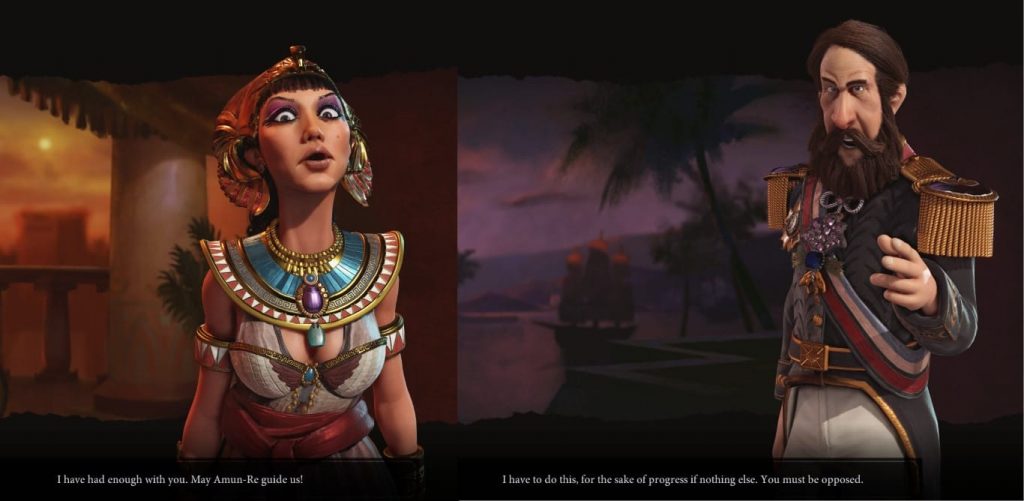
Winning with Ideas, Not Armies
One of the reasons I keep coming back to Civ 6 is that you can win the entire game without ever going to war. The Culture Victory is a testament to this. The goal is to make your civilization’s culture so appealing that you attract more international tourists than any other civ has domestic tourists. You essentially win by being the coolest, most interesting place on Earth.
How do you do it? You create Great Works of art and music. You build breathtaking World Wonders. You set aside land for beautiful National Parks. You even send Rock Bands on world tours to play in other civs’ cities. You are winning by exporting your identity. Your ideas, your art, your values become so dominant that they peacefully achieve what armies cannot.
The game also models this through the Loyalty system. If you have a city with high culture and amenities right next to an opponent’s unhappy city, your influence will “leak” across the border. Their citizens will start to lose loyalty to their old leader and might even choose to flip and join your empire peacefully. It’s a quiet, bloodless takeover driven by the sheer gravitational pull of a better society.
What this feels like in the real world: This is the very definition of soft power. It’s why countries pour money into cultural exports, why the Olympics are such a big deal, and why the global influence of things like Hollywood movies or K-Pop is taken so seriously. In the world of business, it’s brand loyalty. Some companies just sell you a product. But brands like Apple or Nike sell you a lifestyle, an identity. They’ve built a culture that people want to be a part of. Playing for a Culture Victory teaches you that true, lasting influence isn’t always about force; it’s about creating something so attractive that the world comes to you.
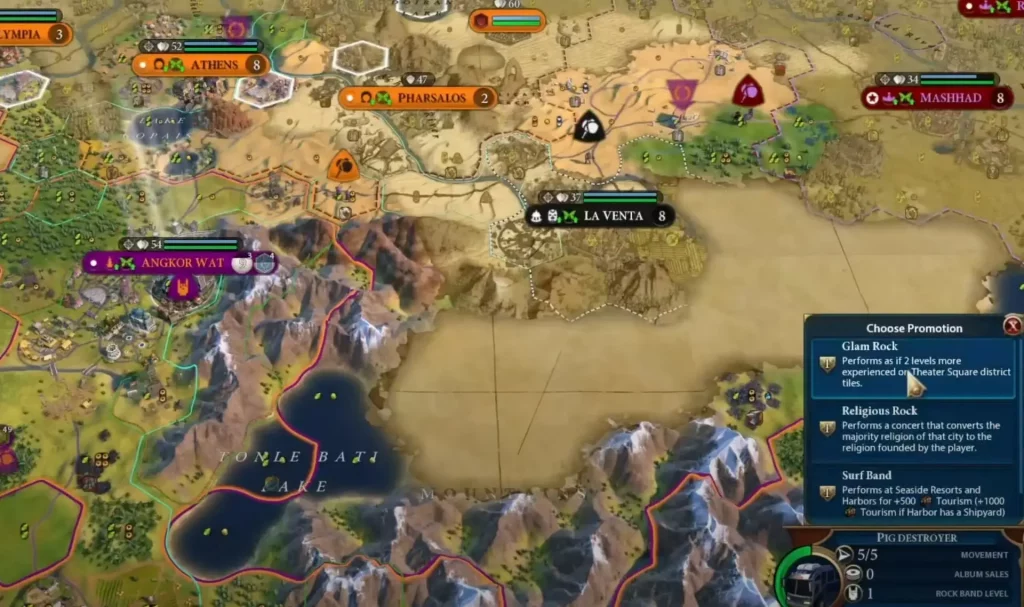
The Art of Balancing Today’s Fires with Tomorrow’s Dreams
Every single turn of Civ 6 pulls you in two directions at once: dealing with the fire right in front of you versus building for the future you want. You see a barbarian scout on a hill near your capital. That’s a five-alarm fire, because you know a swarm of angry spearmen is about to follow. At the same time, your rival just started building the Colosseum, a wonder that would be perfect for your empire.
What do you do? This is the core challenge of the game.
- You can react: You immediately stop what you’re doing and switch production to an Archer to deal with the barbarians. You’re safe for now, but your long-term plans are on hold.
- You can ignore it: You press on with your plan to build a new Settler, hoping your starting warrior can handle it. It’s a risk, but if it pays off, you’re way ahead on your grand strategy.
- You can pay to solve it: You can spend a big chunk of your gold to instantly buy an Archer. It solves the problem without disrupting your city’s main task, but now your treasury is empty, and you can’t afford to upgrade units later.
This constant triage is what leadership is all about. If you only ever react to crises, you’ll spend the whole game just putting out fires. You’ll survive, but you’ll never thrive. But if you only ever focus on your grand vision and ignore the urgent problems, you might find your empire has crumbled before you can ever realize that vision.
What this feels like in the real world: I see this everywhere. A CEO has to choose between hitting the quarterly profit target to please investors (the short-term fire) and investing in risky R&D that might not pay off for years (the long-term dream). A government has to balance funding today’s healthcare needs with investing in education for the next generation. Civ 6 is an incredible simulator for this kind of high-stakes juggling act. It teaches you to quickly assess threats, calculate the cost of dealing with them, and find that razor’s-edge balance between staying alive today and building a better tomorrow.
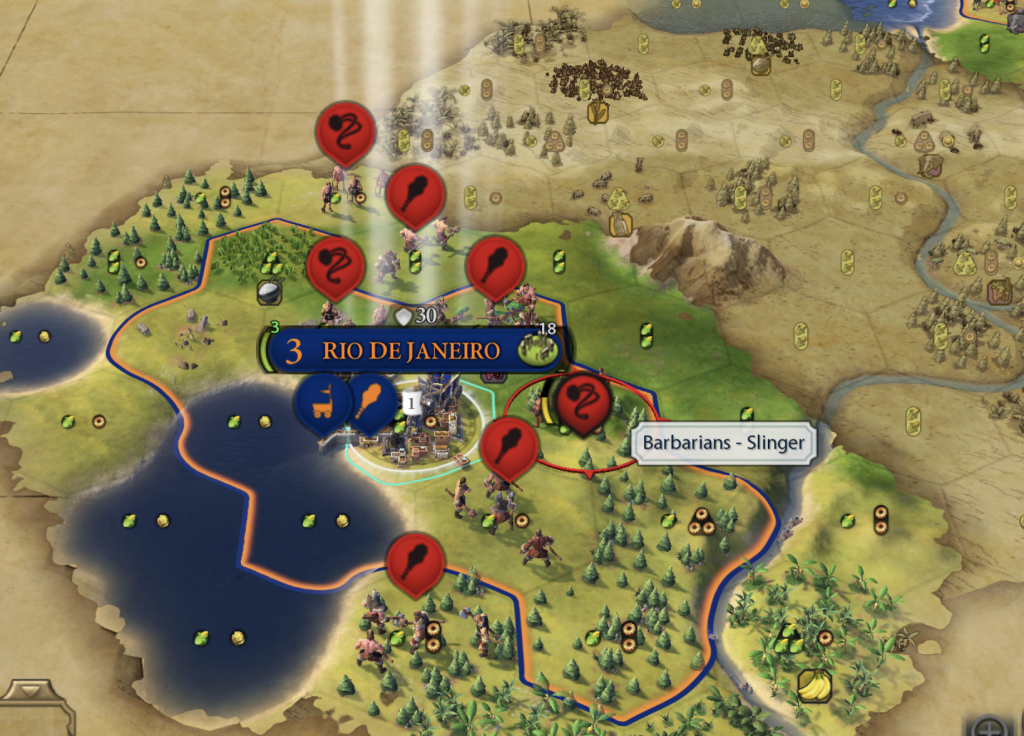
The World in a Hex Grid
When I step back and think about all the hours I’ve poured into Civilization VI, I realize I haven’t just been playing a game. I’ve been learning a new language for understanding the world. It’s a language of trade-offs, of geography, of innovation, and of influence. The game strips away all the noise of our complex reality and shows you the raw mechanics of how societies compete and cooperate.
You don’t just learn these lessons in a detached, academic way. You feel them. You feel the pain of a bad starting location. You feel the thrill of pulling off a perfectly timed Eureka. You feel the satisfaction of seeing your diplomatic maneuvering pay off as you turn two rivals against each other.
For me, Civilization VI is more than just a masterpiece of game design. It’s a sandbox for strategic thinking that has genuinely changed how I see the world. It gives you a framework for thinking about problems, for weighing difficult choices, and for understanding that every decision has ripples that will be felt far into the future. The amazing thing is, the game never really ends when you exit to the desktop. The next turn is always waiting for you, out here in the real world.
